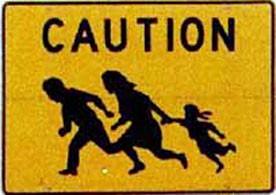While hanging out with my friend, I skimmed through the book and found that the central principles are summarized as:
Nothing real can be threatened.
Nothing unreal exists.
Herein lies the peace of God.
And eventually the conversation moved around to discussing deep subjects like pantheism, Christian Science and wahdat al-wujud (which are all related to redrawing the line between what is real and what is not). But I'm such a big geek that the first thing I thought of was that scene at the beginning of Star Trek IV: The Voyage Home where Spock is being tested by a computer which asks him a series of rapid-fire questions, including: "What was Kiri-kin-tha's first law of metaphysics?" and the answer, of course is, "Nothing unreal exists".
A Course in Miracles has been circulating at least a decade before The Voyage Home came out so I wouldn't be totally surprised if ACIM influenced the Star Trek writers. In fact, real religions often inspire fictional philosophies and belief systems (Dune and Star Wars are two examples which come to mind and which we've discussed here before).
But what is even more surprising is when the influence goes the other way and fiction influences reality.
For example, some of the Church of Scientology's closely guarded beliefs resemble a science-fiction adventure. And some have even suggested that Scientology was invented as the result of a bar bet between the two science fiction authors L. Ron Hubbard and Robert Heinlein. It seems like this most entertaining version of this legend is false, but there seems to be more substantial evidence that L. Ron Hubbard rather cynically suggested starting a religion as a way to make money [1] [2]
A less well-known fact is that Robert Heinlein's science fiction classic, Stranger in a Strange World also inspired the creation of an actual religious group known as the Church of All Worlds.
And of course there was the Jedi census prank a while back, where in several English-speaking countries a large number of people answered "jedi" when asked their religion on the census. ("Jedi" came out as the second largest religion in New Zealand and fourth largest in England and Wales, beating out Sikhism, Judaism and Buddhism) I actually knew I guy once who did Qi Gong and in a light-hearted way he called it his "jedi training".
So sometimes, fiction can seem remarkably substantial and have a surprising amount of impact on the world. And conversely, sometimes the things we take for granted, or are frightened of, or take "seriously" turn out to be unreal at the root. (I think I'm going to stop babbling now before I fall into my navel, and will just do a link dump).
wahdat al-wujud explained by Ustadha Umm Sahl (it is actually more a defense of Abd al-Ghani al-Nablusi, a traditional Hanafi scholar on a number of points, including wahdat al-wujud). Interestingly enough, the Deobandis, whom I have been mentioning recently, also seem to have a strong belief in this mystical doctrine.
Official Site: A Course in Miracles
Wikipedia: A Course in Miracles
Screenplay of Star Trek IV: The Voyage Home
Tongue-in-check discussion and extrapolation of Kiri-Kin-tha’s Laws of Metaphysics
The Pagan Library: The Church of All Worlds, A Brief History
Grenada's past:
unusual churches
only human
bokononism
religion in science fiction
a coincidence you think this is?
so i finally saw it




